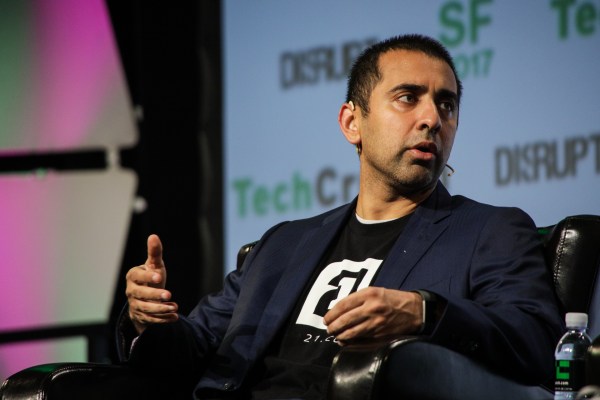Today at Disrupt, 21.co CEO and co-founder Balaji Srinivasan outlined his company’s unusual evolution and announced the launch of a new system for kickstarting the site’s user base by incentivizing people with tokens for doing things like signing up, getting verified and performing certain tasks.
The company opted to move away from the increasingly popular ICO model because it’s looking to build engagement, not raise funds. After all, the company has generated a lot of money through its early bitcoin mining operation, and has a healthy amount of VC backing — not to mention Srinivasan’s own connections — as an Andreessen Horowitz board partner. The company likely could have raised quite a bit in funding through a token sale, but instead opted to use it to kickstart the site.
“What we want is not millions of dollars, it’s millions of users,” he said onstage. “We’ve got it set up to take in labor in exchange for tokens. We have users come to the site, they sign up, they get verified. What that means is that you get tokens for doing the sort of usual things you do on social networks.”
In its current form, the tokens can be used in-network. It’s sort of like getting Toys ‘R’ Us bucks — a form of currency designed to be used on the site itself. That means engaged users can essentially get funding to help pay for things like say, the $100 it costs to get a meaningful response from Marc Andreessen on the network. The ICO/token system has proven a popular one for platforms like Kik looking to take on social media giants.
The tokens also will eventually be able to be listed on exchanges, which means they could have some semblance of real-world value outside of 21.co‘s walled garden. Though Srinivasan is quick to distinguish the idea from equity in that having this sort of financial stake in the company doesn’t entitle users to any sort of input in the site.
Tokens aside, 21.co‘s model is a strange one from the outside. For most of us, it’s hard to imagine a scenario in which $20, $50 or $100 is a reasonable sum to pay for the promise of getting a single email back from a user. Srinivasan, however, insists that it could be a useful tool for businesses that would have less of an issue swallowing that per-message pricing. The system also allows for bulk messages, so companies can hit up a slew of influencers all in one go.
As far as what all of this actually has to do with 21.co‘s roots in bitcoin, Srinivasan sees the service as a method for achieving his longstanding goal of helping bring the concept of cryptocurrency to a more mainstream audience. The site does that, in part, by paying users in bitcoin. It’s a fairly tenuous connection with the service’s initial objective, but rather than cutting its losses when the company could no longer compete with Chinese bitcoin mining operations, the executive opted to try something else altogether.
“Most rational people would have just shut it down,” he said onstage. “There are many moments when the rational act would have been to just give up and quit. You’re only a founder if you do things in a sometimes irrational way because you hate to lose.”
